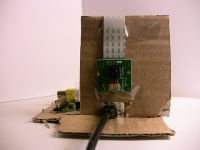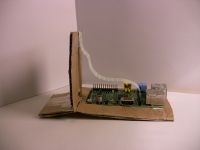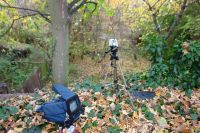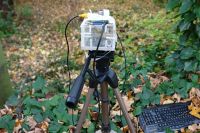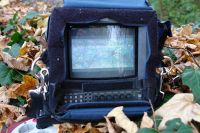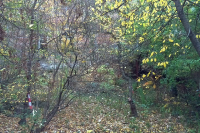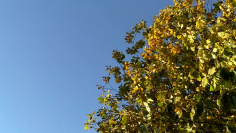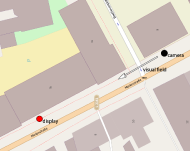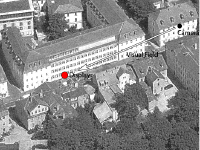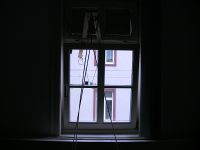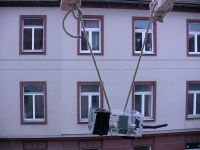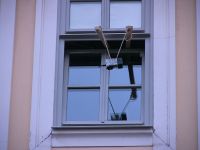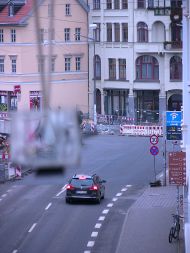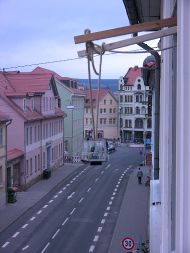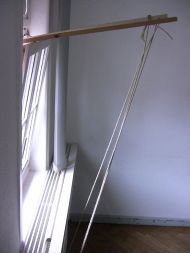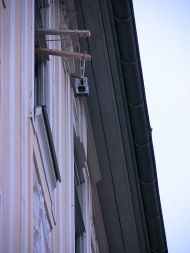| (95 intermediate revisions by 2 users not shown) | |||
| Line 2: | Line 2: | ||
<small>“I'm an eye. A mechanical eye. I, the machine, show you a world the way only I can see it. I free myself for today and forever from human immobility. I'm in constant movement. […] Freed from the boundaries of time and space, I co-ordinate any and all points of the universe, wherever I want them to be. My way leads towards the creation of a fresh perception of the world.” </small> | <small>“I'm an eye. A mechanical eye. I, the machine, show you a world the way only I can see it. I free myself for today and forever from human immobility. I'm in constant movement. […] Freed from the boundaries of time and space, I co-ordinate any and all points of the universe, wherever I want them to be. My way leads towards the creation of a fresh perception of the world.” </small> | ||
The Kinoki-Pi-Project is seeking for a medial interface between esthetic meditation and systematic surveillance of society. Therefore we will create and use different artifacts to deal with the meaning of visual observation in urban spaces and landscapes. | The Kinoki-Pi-Project is seeking for a medial interface between esthetic meditation and systematic surveillance of society. Therefore we will create and use different artifacts to deal with the meaning of visual observation in urban spaces and landscapes. | ||
== | ==concept== | ||
The | The concept of this project is based so far on two terms. On the one hand the term [http://en.wikipedia.org/wiki/Dziga_Vertov#Cine-Eye kinoglaz] as it is described by Dziga Vertov in the quotation at the beginning of this page. For the russian avantgardist the mechanical eye of the camera allows us an objective view on our environment that is detached from our own bodily limitation and capacity as humans. And on the other hand the metaphor of the [http://en.wikipedia.org/wiki/Panopticism panopticon] as the perfect apparatus of social surveillance Michel Foucault describes in „Discipline and Punish: The Birth of the Prison” | ||
You can read and download the concept [[media:here.pdf|here]]. At the moment it is only available in German. | |||
==prototyp== | ==prototyp== | ||
For our | For our surveillance devices we used a raspberry pi microcomputer combined with a camera module. This is how the first prototype looked like: | ||
[[File:Prototyp01.jpg|200px]] [[File:Prototyp02.jpg|200px]] | |||
You want to build your own surveillance device with a raspberry pi + a camera module? Take a look at our [[media:DIYSC.pdf|„DIY Manual”]]! | |||
==start recording== | |||
After we finished to program the Pi and got used to the Command-Line-Feeling we started to record looking for aesthetic structures in the garden. | |||
[[File:Action01.jpg|200px]] [[File:Action02.jpg|200px]] [[File:Action03.jpg|200px]] [[File:RaspiStill01.png|200px]] | |||
[[File:RaspiStill02.png|236px]] | |||
==next step: „NeunSieben”== | |||
„NeunSieben” is the idea to create a surveillance situation in public space. Therefore we chose the the Marienstraße, where our workspace is located. A fixed installed KinokiBot monitors the street down to the M5, where the GMU rooms are located. We will use a window in the ground floor of the M7 to present the monitoring of the surveillance camera to the public. An arrow on the sideway helps to draw attention to the monitor behind the window. | |||
[[file:NeunSiebenOSMAP.png|190px]] [[file:NeunSieben01.png|200px]] | |||
[[file:NeunSiebenDoku01.png|200px]] | |||
[[file:NeunSiebenDoku03.png|200px]] | |||
[[file:NeunSiebenDoku04.png|200px]] | |||
[[file:NeunSiebenDoku08.png|190px]] | |||
[[file:NeunSiebenDoku07.png|190px]] | |||
[[file:NeunSiebenDoku05.png|190px]] | |||
[[file:NeunSiebenDoku06.png|190px]] | |||
<videoflash type="vimeo">81346901|500|280</videoflash> | |||
== further thoughts: "SCW"== | |||
In the city of Weimar [http://www.belvedere-express.de/webcams there] are two public available "surveillance" cameras in public space. Actually they are not regular "surveillance" cameras as these are not for any safety purpose in the first place. They seemed to be more a tourist kind of stuff. | |||
[[File:2013-11-05-14-38-image.jpg|100px]] | |||
[[File:2013-11-05-14-39-image.jpg|100px]] | |||
[[File:2013-11-05-14-40-image.jpg|100px]] | |||
[[File:2013-11-05-14-42-image.jpg|100px]] | |||
[[File:2013-11-05-14-43-image.jpg|100px]] | |||
[[File:2013-11-05-14-44-image.jpg|100px]] | |||
[[File:2013-11-05-14-46-image.jpg|100px]] | |||
[[File:2013-11-05-14-47-image.jpg|100px]] | |||
[[File:2013-11-05-14-49-image.jpg|100px]] | |||
Klick [http://webcam-markt.belvedere-express.de/image.jpg?1383660476 here] for a sole view on the market place. | |||
==aesthetic meditation/ material study== | |||
<videoflash type="vimeo">81348623|500|280</videoflash> | |||
== pure data patches== | |||
[[media:color_reader.pd|Diagrams]] reads the colors of an image or a video in order to create a diagramm from the recieved information. | |||
==links== | ==links== | ||
= | ''art'' | ||
* [http://www.koener.de/suburbsofthevoid.htm suburbs of the void] by Thomas Köner | |||
* [http://www.bcchang.com/art/insecuritycamera/index.php (In)Security Camera]by Ben Chang, Silvia Ruzanka, Dmitry Strakovsky | |||
* [http://www.simonmenner.com/pages/Stasi-Index.htm Images from the Secret Stasi Archives] by Simon Menner | |||
* [http://www.chrisoakley.com/the-catalogue The Catalogue] by Chris Oakley | |||
* [http://www.ubermatic.org/?p=221 Life: A User's Manual] by Michelle Teran | |||
* [http://www.jamespatten.com/cfd/ Corporate Fallout Detector] by James Patten | |||
* [http://s-77ccr.org/about.php System-77] and [http://makrolab.ljudmila.org/ Makrolab] by Marko Peljhan | |||
* [http://www.francisalys.com/online/nightwatch.html The Nightwatch] by Francis Alys | |||
*[http://doc.ycam.jp/work/index_en.html Desire of Codes] by Misami Seiko | |||
''articles'' | |||
* [http://www.arte.tv/de/videokontrolle-in-der-medienkunst/765396,CmC=796112.html Arte - Videokontrolle in der Medienkunst] | |||
* [http://ctrlspace.zkm.de/d/ Rhetorik der Überwachung - von Bentham bis Big Brother]: An Exhibition (2000) on Surveillance in the zkm | |||
==literature== | |||
Vertov, Dziga (1973): Schriften zum Film. München: Hanser. | * Bauman, Zygmunt (2003): Flüchtige Moderne. Frankfurt am Main: Suhrkamp. | ||
* Debord, Guy (1978): Gesellschaft des Spektakels. Hamburg: Nautilus. | |||
* Foucaul, Michel (2010): Überwachen und Strafen. Die Geburt des Gefängnisses. Frankfurt am Main: Suhrkamp. | |||
* Vertov, Dziga (1973): Schriften zum Film. München: Hanser. | |||
*Kammerer, Dieter (2008): Bilder der Überwachung. Suhrkamp | |||
Latest revision as of 01:25, 9 December 2013
kinoki-pi-project
“I'm an eye. A mechanical eye. I, the machine, show you a world the way only I can see it. I free myself for today and forever from human immobility. I'm in constant movement. […] Freed from the boundaries of time and space, I co-ordinate any and all points of the universe, wherever I want them to be. My way leads towards the creation of a fresh perception of the world.”
The Kinoki-Pi-Project is seeking for a medial interface between esthetic meditation and systematic surveillance of society. Therefore we will create and use different artifacts to deal with the meaning of visual observation in urban spaces and landscapes.
concept
The concept of this project is based so far on two terms. On the one hand the term kinoglaz as it is described by Dziga Vertov in the quotation at the beginning of this page. For the russian avantgardist the mechanical eye of the camera allows us an objective view on our environment that is detached from our own bodily limitation and capacity as humans. And on the other hand the metaphor of the panopticon as the perfect apparatus of social surveillance Michel Foucault describes in „Discipline and Punish: The Birth of the Prison”
You can read and download the concept here. At the moment it is only available in German.
prototyp
For our surveillance devices we used a raspberry pi microcomputer combined with a camera module. This is how the first prototype looked like:
You want to build your own surveillance device with a raspberry pi + a camera module? Take a look at our „DIY Manual”!
start recording
After we finished to program the Pi and got used to the Command-Line-Feeling we started to record looking for aesthetic structures in the garden.
next step: „NeunSieben”
„NeunSieben” is the idea to create a surveillance situation in public space. Therefore we chose the the Marienstraße, where our workspace is located. A fixed installed KinokiBot monitors the street down to the M5, where the GMU rooms are located. We will use a window in the ground floor of the M7 to present the monitoring of the surveillance camera to the public. An arrow on the sideway helps to draw attention to the monitor behind the window.
<videoflash type="vimeo">81346901|500|280</videoflash>
further thoughts: "SCW"
In the city of Weimar there are two public available "surveillance" cameras in public space. Actually they are not regular "surveillance" cameras as these are not for any safety purpose in the first place. They seemed to be more a tourist kind of stuff.
Klick here for a sole view on the market place.
aesthetic meditation/ material study
<videoflash type="vimeo">81348623|500|280</videoflash>
pure data patches
Diagrams reads the colors of an image or a video in order to create a diagramm from the recieved information.
links
art
- suburbs of the void by Thomas Köner
- (In)Security Cameraby Ben Chang, Silvia Ruzanka, Dmitry Strakovsky
- Images from the Secret Stasi Archives by Simon Menner
- The Catalogue by Chris Oakley
- Life: A User's Manual by Michelle Teran
- Corporate Fallout Detector by James Patten
- System-77 and Makrolab by Marko Peljhan
- The Nightwatch by Francis Alys
- Desire of Codes by Misami Seiko
articles
- Arte - Videokontrolle in der Medienkunst
- Rhetorik der Überwachung - von Bentham bis Big Brother: An Exhibition (2000) on Surveillance in the zkm
literature
- Bauman, Zygmunt (2003): Flüchtige Moderne. Frankfurt am Main: Suhrkamp.
- Debord, Guy (1978): Gesellschaft des Spektakels. Hamburg: Nautilus.
- Foucaul, Michel (2010): Überwachen und Strafen. Die Geburt des Gefängnisses. Frankfurt am Main: Suhrkamp.
- Vertov, Dziga (1973): Schriften zum Film. München: Hanser.
- Kammerer, Dieter (2008): Bilder der Überwachung. Suhrkamp
